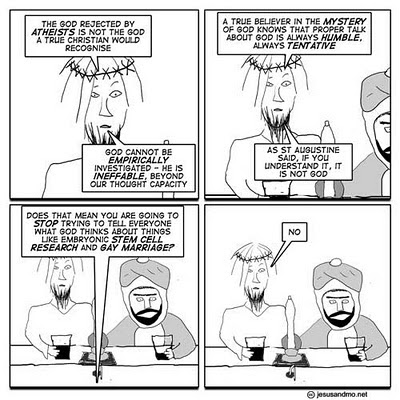Thursday, October 14, 2010
ineffable
1. Mysticism is the deliberate transformation of consciousness in an attempt to gain access to a higher ________, on the assumption that ordinary thought and language cannot express it.
2. Jewish mysticism is called ________ , or "tradition". ______ is an Islamic mystical tradition related to neo-Platonism which aims to eliminate ___ .
3. "What is the sound of one hand clapping?" is an example of a ___ ____, which attempts to subvert our usual habits of thought and break down everyday logical thinking.
4. Zen Buddhism says all things depend on their relations to everything else, implying the ____________ of everything.
5. Admirers of Aristotle who walked around with him as he lectured were called ____________. They were strongly influenced by ________.
6. _________ rejected Neoplatonism and said literalism was good enough for ordinary people but that educated people required persuasive, reasoned argument.
7. _________ attempted to reconcile religion with reason and science.
8. _______, whose motto was "Faith seeking to understand," advanced his ontological argument for the existence of God in order to ___________. (persuade nonbelievers, clarify "God" for believers)
9. _______ was a nominalist, contending that only individuals exist. Those who say that universals exist are ________. Abelard's view was that they are tricked by _____.
10. Aquinas agreed with Aristotle: an ______________ makes no sense and should not be accepted in philosophy or theology.
2. Jewish mysticism is called ________ , or "tradition". ______ is an Islamic mystical tradition related to neo-Platonism which aims to eliminate ___ .
3. "What is the sound of one hand clapping?" is an example of a ___ ____, which attempts to subvert our usual habits of thought and break down everyday logical thinking.
4. Zen Buddhism says all things depend on their relations to everything else, implying the ____________ of everything.
5. Admirers of Aristotle who walked around with him as he lectured were called ____________. They were strongly influenced by ________.
6. _________ rejected Neoplatonism and said literalism was good enough for ordinary people but that educated people required persuasive, reasoned argument.
7. _________ attempted to reconcile religion with reason and science.
8. _______, whose motto was "Faith seeking to understand," advanced his ontological argument for the existence of God in order to ___________. (persuade nonbelievers, clarify "God" for believers)
9. _______ was a nominalist, contending that only individuals exist. Those who say that universals exist are ________. Abelard's view was that they are tricked by _____.
10. Aquinas agreed with Aristotle: an ______________ makes no sense and should not be accepted in philosophy or theology.
Subscribe to:
Post Comments (Atom)












 Charles Darwin (
Charles Darwin (















No comments:
Post a Comment